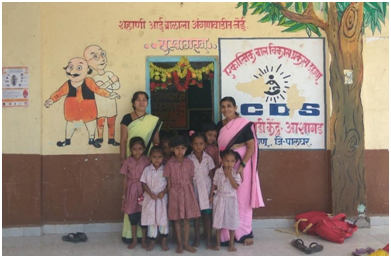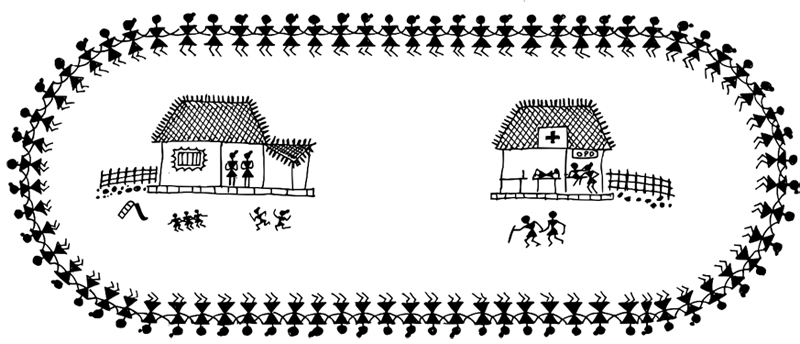There is a commotion in the auditorium. You will feel the enthusiasm in the air. Batches of students are running from one Group Discussion to another. There is a constant hum of background talks, only to be periodically interrupted by cries of joy as people announce their selection into their dream companies. It’s Day Zero-the first D-Day of an MBA Students life, Summer Placements.
Amidst all this frenzy, there I am, sitting quietly, with a book on my lap. For, after repeated advise by friends, alumni and seniors to fall in line and not take an uninvited risk with my career, I had done the inevitable.
I had opted out!
After a long work experience in the IT Industry, I was not particularly excited about the idea of another corporate assignment in my summers and was on the lookout for some interesting opportunities to explore, learn and contribute. Due to my interest in governance and social sector, I was considering the idea of an internship in these fields. What pleased me was the fact that there were at least a few blogs and articles about students from IIM A and XLRI who had pursued their summer internships with various development organisations and government.
Adding to this was the fact that I was aware of problems like malnutrition etc. which existed in my own district of Palghar in Maharashtra. I had ardently wished to try and contribute towards solutions to these problems. Finally, I mustered the courage and mailed my district administrative leadership about my intent. Frankly speaking, my stereotyped brain was not expecting any response.
But to my surprise, the administration from my district did give me a reply and connected me with the appropriate authorities. My joy knew no bounds when I received an internship offer from CTARA, IITB for contributing towards improving governance of my own district administration of Palghar.
Nutrition is a priority sector for Palghar District of Maharashtra, which has become the poster child of malnutrition in recent years. However, in spite of tremendous efforts and money being poured in by the government and a plethora of organisations working in the district, the results are far from desired. The tendency for all these organisations to work in silos often resulted in duplication of work and also the ineffective distribution of incoming funds. It was in this context that Mr Milind Borikar, IAS and CEO of Palghar ZP spoke to UNICEF Mumbai Office and Centre for Technology Alternatives for Rural Areas (CTARA), IIT Bombay that the administration should have a central repository of current infrastructural status of various departments related to Nutrition service delivery so that gaps could be identified and prioritised and consequently any future incoming CSR activities could be directed towards filling these gaps on priority. This whole concept was nicely summed up in the phrase ‘menu card for district‘.
The objective of my Internship thus became ‘Creation of data-driven decision mechanism to guide/compliment and equitably distribute incoming corporate CSR activities (philanthropic activities) within Palghar District.’ This entire project was led by Digvijay Shinde, State nutrition consultant at UNICEF and alumnus of CTARA, IITB under the guidance of Dr Satish Agnihotri Head, CTARA, IITB.
To create this framework, first data had to be collected, and that too quickly and accurately. For this, our team decided to use mobile-based open-source Kobo Toolbox technology for data collection. We trained 300+ government survey officials and NGO field workers through workshops in all 8 blocks of the district. With their help, we collected this data for each of the approximately 3200 Anganwadis, 50 Primary Health Care Centres and 350 Sub Centres in the entire district. All this was being done in and around the days of Lok Sabha elections scheduled in our constituency in the last week of April! We designed simple solutions like dashboards to help monitor and visualise the progress of data collection drive. This collected data was then used to study the gaps in service delivery. It also helped us spatially visualise the state of infrastructure based on various parameters.

Figure 1: Simple Dashboards like these using open platforms have the potential to improve the monitoring of initiatives.
The ultimate goal is to ensure that all this data will be finally available for NGO and citizens in an easy to visualise format on an online portal whose beta version is already in place. You can see this at csrzppalghar.org
In the last days of my internship, we were able to show the progress and capabilities in a meeting with the district government and NGO officials and also gathered valuable feedback on how this could be used to solve the actual ground problems.


Figure 2: Good Infrastructure has shown improvement in attendance and a corresponding improvement in nutrition status
When I reflect back at my Internship period, I realise that it was a period of great learnings. I learnt that while we take many things for granted while staying amongst a highly intelligent crowd in a coveted B-School, the people you may be working with (field workers conducting the survey) may not be so adept and may have the most elementary problems. Working with Digvijay, I learnt how important it was to empathise and patiently handle their queries. I learnt that although we easily stereotype government officials as being corrupt, I was pleased to find many officials across all strata of the governance who were working sincerely to help solve the issues around them. I wish administrations should have more systemic platforms for appreciating the good work done by these soldiers.

Figure 3: During one of our surprise visits, we were pleased to see Children being served Eggs in an Anganwadi in Jawahar Block of Palghar District.
At a strategic level, I learnt that there is great potential for all of us to contribute to improving the governance by helping them solve some of the basic problems they face in real life using all the advanced tools and data analytics skills that we learn. A simple VBA macro/script you write can give relief to the field worker from hours of the agony of manual work. A small dashboard can improve monitoring efficiency. Decisions to incorporate advanced tools for data collection can not only save months of digitisation exercise but also help make it more useful. Open platforms like Kobo, CommunityGIS by Prof. Jitendra Shah at IITB are taking the power of technology into the hands of the masses, and these can be surely leveraged.
So that was the story of my Summer Internship. Of course, I missed out on things like a polished corporate experience but what I got in return was a sense of satisfaction of having contributed my bit towards a place of your own which was much more than that. Here’s to all the mavericks of the Nutrition Group at CTARA, IITB, esteemed Professors Dr Satish Agnihotri Sir, Dr Rupal Dalal Madam, Prof. Jitendra Shah Sir, Digvijay Shinde from UNICEF, ZP Palghar ICDS and Health Department authorities, and all the NGO volunteers and CSR Partners working in the district, it was an honour and an absolute pleasure working with all of you.
Who says Internships aren’t transformative?

About the Author

Vaibhav Sarkale is a second-year MBA student at IIM Udaipur. His interests lie in the fields of business policy and strategy, storytelling and public policy. He is an active toastmaster, runner and cyclist. He also co-founded the Public Policy Group at IIM Udaipur. You can connect with him on LinkedIn
